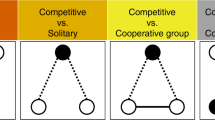Abstract
Drawing on Rawls’s distinction between the summary and the practice concepts of rules, Searle suggested to distinguish between constitutive and regulative rules. This distinction has become popular and is accepted by many contemporary philosophers as the basis for discussing the essence of games, language, social and cultural norms in general. On the other hand, some authors criticize this distinction as either unjustified in general or inapplicable for explaining certain types of norms. The three most frequently discussed issues in this context today are the validity of the initial distinction between rule types, the soundness of the analogy between sports games and speech acts, and the possibility of understanding constitutive rules as conventions. In the debates, the rules of games are usually understood as if they constituted the game completely and before their introduction the game did not exist. Moreover, most authors discuss the issue of rules as if there were no difference between implicit and explicit rules. At the same time, the most difficult problem is to explain the normative force of the rules. If the rules are understood as what is collectively accepted by the vast majority of the population—and that is what most authors suggest, the problem remains of explaining why this happens. Building on the ideas of Millikan, the present suggests that some of so called constitutive rules can be understood as natural conventions. One should distinguish, on the one hand, the rules of artificial games and, on the other hand, the conventional foundations of natural games and other areas of behavior, which for the time being are not codified and are understood by each player in their own way. The rationale for normativity could be due precisely to the fact that there are natural conventions that have been tested by time and rooted in tradition.
Access this chapter
Tax calculation will be finalised at checkout
Purchases are for personal use only
Similar content being viewed by others
References
Rawls, J.: Two concepts of rules. Philos. Rev. 64(1), 3–32 (1955). https://doi.org/10.2307/2182230
Searle, J.R.: How to derive “ought” from “is.” Philos. Rev. 73(1), 43–58 (1964). https://doi.org/10.2307/2183201
Hage, J.: Separating rules from normativity. In: Araszkiewicz, M., Banaś, P., Gizbert-Studnicki, T., Płeszka, K. (eds.) Problems of Normativity, Rules and Rule-Following. Law and Philosophy Library, vol. 111, pp. 13–29. Springer, Cham (2015). https://doi.org/10.1007/978-3-319-09375-8_2
Williamson, T.: Knowing and asserting. Philos. Rev. 105(4), 489–523 (1996). https://doi.org/10.2307/2998423
Maitra, I.: Assertion, norms, and games. In: Brown, J., Cappelen, H. (eds.) Assertion: New Philosophical Essays, pp. 277–296. Oxford University Press, NewYork (2011)
Johnson, C.R.: What norm of assertion? Acta Analytica 33(1), 51–67 (2017). https://doi.org/10.1007/s12136-017-0326-3
Marmor, A.: Social Conventions: From Language to Law. Princeton University Press, Princeton (2009). https://doi.org/10.1515/9781400831654
Lewis, D.: Convention: A Philosophical Study. Harvard University Press, Cambridge (1969)
Lewis, D.: Languages and language. In: Gunderson, K. (ed.) Minnesota Studies in the Philosophy of Science, pp. 3–35. University of Minnesota Press, Minneapolis MN (1975)
Millikan, R.G.: Language conventions made simple. J. Philos. 95(4), 161–180 (1998). https://doi.org/10.2307/2564683
Searle, J.R.: Speech Acts: An Essay in the Philosophy of Language. Cambridge University Press, Cambridge UK (1969). https://doi.org/10.1017/CBO9781139173438
Searle, J.R.: The Construction of Social Reality. Free Press, New York (1995)
Searle, J.R.: Constitutive Rules [Special Issue]. Argumenta 4(1), 51–54 (2018). https://doi.org/10.14275/2465-2334/20187.sea
Anscombe, G.E.M.: On brute facts. Analysis 18(3), 69–72 (1958). https://doi.org/10.1093/analys/18.3.69
Searle, J.R.: How to derive “ought” from “is” revisited. In: Di Lucia, P., Fittipaldi, E. (eds.) Revisiting Searle on Deriving “Ought” from “Is”, pp. 3–16. Palgrave Macmillan, Cham (2021). https://doi.org/10.1007/978-3-030-54116-3_1
Ransdell, J.: Constitutive rules and speech-act analysis. J. Philos. 68(13), 385–400 (1971). https://doi.org/10.2307/2025037
Raz, J.: Practical Reason and Norms. Hutchinson & Sons, London (1975). https://doi.org/10.1093/acprof:oso/9780198268345.001.0001
Miller, D.: Constitutive rules and essential rules. Philos. Stud. 39(2), 183–197 (1981). https://doi.org/10.1007/bf00367419
Giddens, A.: The Constitution of Society: Outline of the Theory of Structuration. Polity Press, Cambridge (1984)
Ruben, D.-H.: John searle’s the construction of social reality. Philos. Phenomenol. Res. 57(2), 443–447 (1997). https://doi.org/10.2307/2953734
Hindriks, F.: Constitutive rules, language, and ontology. Erkenntnis 71, 253–275 (2009). https://doi.org/10.1007/s10670-009-9178-6
Hindriks, F., Guala, F.: Institutions, rules, and equilibria: a unified theory. J. Inst. Econ. 11(3), 459–480 (2015). https://doi.org/10.1017/S1744137414000496
Hindriks, F.: Can constitutive rules bridge the gap between is- and ought-statements? In: Di Lucia, P., Fittipaldi, E. (eds.) Revisiting Searle on Deriving “Ought” from “Is”. Palgrave Macmillan, Cham (2021). https://doi.org/10.1007/978-3-030-54116-3_12
Epstein, B.: The and Trap: Rebuilding the Foundations of the Social Sciences. Oxford University Press, NewYork (2015)
Roversi, C.: In defence of constitutive rules. Synthese 199, 14349–14370 (2021). https://doi.org/10.1007/s11229-021-03424-w
García-Carpintero, M.: How to understand rule-constituted kinds. Rev. Philos. Psychol. 13, 7–27 (2022). https://doi.org/10.1007/s13164-021-00576-z
Austin, J.L.: How to Do Things with Words: The William James Lectures delivered at Harvard University. Oxford University Press, Oxford (1962). https://doi.org/10.1093/acprof:oso/9780198245537.001.0001
Fox, K.: Watching the English: The Hidden Rules of English Behaviour, 2nd edn. Hodder, London (2014)
Millikan, R.G.: A difference of some consequence between conventions and rules. Topoi 27, 87–99 (2008). https://doi.org/10.1007/s11245-008-9026-3
Author information
Authors and Affiliations
Corresponding author
Editor information
Editors and Affiliations
Rights and permissions
Copyright information
© 2023 The Author(s), under exclusive license to Springer Nature Switzerland AG
About this paper
Cite this paper
Serikov, A.E. (2023). Constitutive Rules of Artificial Games and Natural Conventions of Ordinary Behavior. In: Bylieva, D., Nordmann, A. (eds) The World of Games: Technologies for Experimenting, Thinking, Learning. PCSF 2023. Lecture Notes in Networks and Systems, vol 830. Springer, Cham. https://doi.org/10.1007/978-3-031-48020-1_6
Download citation
DOI: https://doi.org/10.1007/978-3-031-48020-1_6
Published:
Publisher Name: Springer, Cham
Print ISBN: 978-3-031-48019-5
Online ISBN: 978-3-031-48020-1
eBook Packages: Intelligent Technologies and RoboticsIntelligent Technologies and Robotics (R0)




